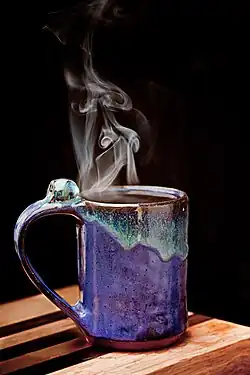釉薬
Japanese
Etymology 1
| Kanji in this term | |
|---|---|
| 釉 | 薬 |
| うわ Jinmeiyō |
くすり > ぐすり Grade: 3 |
| kun’yomi | |
| Alternative spelling |
|---|
| 釉藥 (kyūjitai) |
Originally a compound of 上 (uwa, “over, on top of”, ancient combining form of modern ue) + 薬 (kusuri, “a chemical, a substance with mystical properties”). The kusuri changes to gusuri as an instance of rendaku (連濁).
Alternative forms
- 上薬, 釉
Pronunciation
Etymology 2
| Kanji in this term | |
|---|---|
| 釉 | 薬 |
| ゆう Jinmeiyō |
やく Grade: 3 |
| on’yomi | |
| Alternative spelling |
|---|
| 釉藥 (kyūjitai) |
From Middle Chinese 釉藥 (*yuw jɨɐk̚).
References
- Matsumura, Akira, editor (2006), 大辞林 [Daijirin] (in Japanese), Third edition, Tōkyō: Sanseidō, →ISBN
This article is issued from Wiktionary. The text is licensed under Creative Commons - Attribution - Sharealike. Additional terms may apply for the media files.
